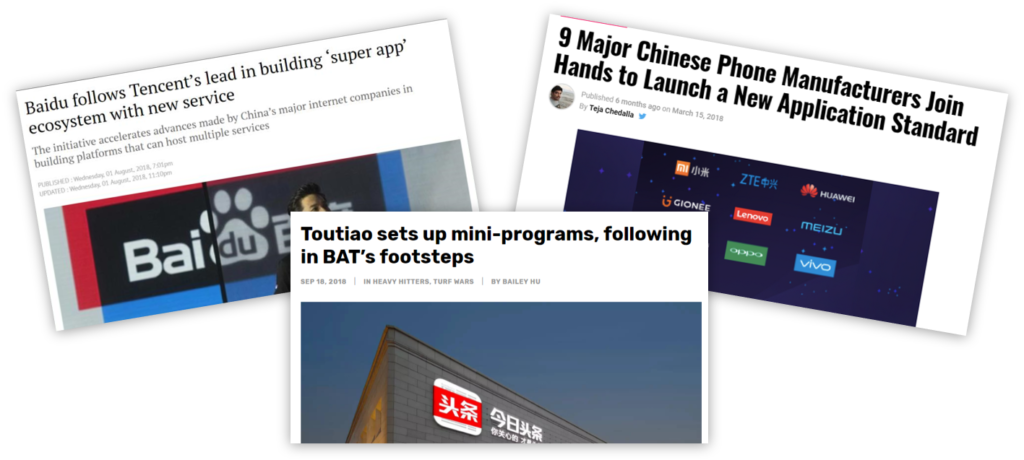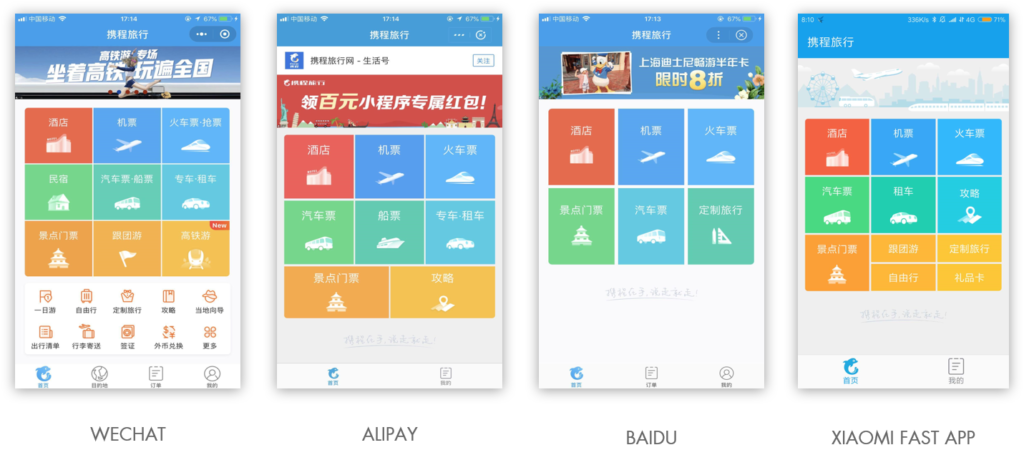From January 2017 and the launch Mini Program by Tencent, this model and technology have shown some tangible proof of efficiency to meet users’ expectations and behaviours in a specific scenario. So the other Chinese giant such as Alibaba, Baidu and Bytedance would like to take the curve in order to:
- offer similar user-friendly experience to their users
- help merchants acquire users
They are progressively opening the doors for developers to develop this type of technology on their platforms.

1. Alibaba / Alipay Mini App
In September 2018, Alipay launched Mini Program.
- Taobao Launches Mini-program to Compete Against WeChat | February 2019 [Walkthechat]
- Alipay releases “mini-programs” in response to WeChat | May 2017 [Walkthechat]
- Alipay opens up its mini program to users for beta test | September 2017 [Technode]
- We’ve experimented with Alipay Mini Programs | December 2017 [Medium – Thibault Genaitay] =>
- They are 99% identical to WeChat MPs, to a point they have been accused of plagiarization
- They offer a couple unique functions, such as retrieving contacts’ details (down to the phone number!
), and read Sesame credit score. That opens the door to reward high score prospects and clients with exclusive benefits. - Expect cross-platform development to mature quickly, and allow to develop all Mini Program variants from a single, unified codebase.

2. Bytedance Mini App
ByteDance-backed platforms Douyin and Toutiao turn to Instant App technology as well:
- In October 2018, TikTok launched Mini Program
- In November 2018, Toutiao launched Mini Program
- ByteDance Mini-Program: eCommerce Applet Development & Strategy | July 2019 [TMO Group]
- Short video app Douyin launches mini-program feature | December 2018 [Technode]
- Toutiao sets up mini-programs, following in BAT’s footsteps | September 2018 [Technode]
3. Baidu Mini Program
In July 2018, Baidu launched Mini Program.
- Baidu Mini-Program: eCommerce Applet Breakdown | August 2019 [TMO Group]
- An overview and analysis of Baidu Mini Program |April 2019 [Medium – WeChat Mini Programmer]
4. Timeline
| Date | Updates | Source / more details |
| June 2019 | In the Chinese digital landscape, a growing number of players has adopted Mini Program technology by opening their platform for developers to build on top. There were 2 actors in June 2018 and they are 8 in June 2019: WeChat – Kuaiying – Alipay – Toutiao – Douyin – Baidu – Taobao – QQ (screenshot 1) | screeshot 1 ikanchai |
| May 2019 | Baidu claim some user tractions: – 200M MAUs (May 2019) – 147M MAUs (Q4 2018) | |
| February 2019 | Taobao (Alibaba) have started boasting 3rd parties to develop Mini Program on their ecosystem. | WalktheChat |
| January 2019 | By Jan 2019, Alibaba released some data about its Mini Program 4 months after launch: – 500 million Mini Program users – 170 million daily active users – 43% 7-day retention rate | WalktheChat |
| December 2018 | Douyin (Bytedance) launches mini-program feature (only functional on Android) | Technode |
| September 2018 | – Public release of Alibaba (Alipay) Mini Programs: access to Zhima Credit Score + 1Bn RMB fund allocated to the new division – Private beta of Toutiao Mini Programs > one of the biggest content distribution App in China | |
| July 2018 | Private beta of Baidu Mini Programs > search engine traffic and solid AI toolkit | |
| March 2018 | 9 Chinese phone manufacturers join forces to issue an OS-level light app standard | |
| August 2017 | Private beta of Alibaba MPs | |
| January 2017 | Public release of WeChat Mini Programs | |
| 2015 | Google issues the first Progressive Web Apps (PWA) standardization draft |
